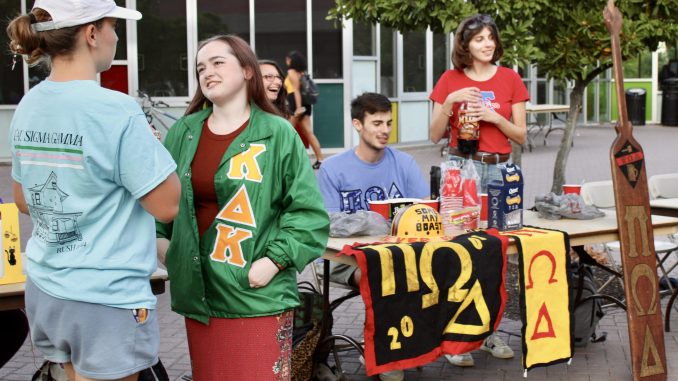
Rush week has concluded for the fall semester, bids have been distributed, and decisions have been made. However, acceptance of bids marks only the beginning of a much deeper journey. Have you ever wondered how members of Greek organizations seem to possess such extensive knowledge of their history and traditions? It’s not merely a “learn as you go” process. I had the opportunity to sit down with Tilly Dumaine ‘25, President of Kappa Delta Kappa (KDK), Ursinus College’s local gender-neutral sorority, to gain insight into the New Member Education (NME) process.
“New member educ ation is the time that new members get to learn about the sorority, fraternity, or Greek society that they are joining. They get to learn our history, traditions, customs, and values. Most importantly, NME provides an invaluable opportunity to bond with your line and get to know and bond with the sisters/brothers/siblings of your organization,” explains Dumaine when asked to summarize NME.
To ensure full integration of new members, the education period spans approximately six weeks, concluding just before Halloween this year. To maintain academic focus and foster a positive mindset, Greek organizations are prohibited from hosting parties during this period in order to create authentic bonds with new fellow brothers and sisters. Dumaine adds, “My favorite thing about NME is helping facilitate new friendships and watching everyone come together as a sisterhood. Witnessing the love, support, and cheer shared between new members, lines, and sisters is truly special.”
Behind the scenes, both new and current members are hard at work even before the education process begins. Each new member is required to attend a pre-NME meeting where expectations and anti-hazing policies are thoroughly reviewed. Anti-hazing is a significant priority within the Ursinus community, and plans for New Member Education must be submitted by the organization and reviewed in advance to ensure that no activities are potentially harmful to students. This precaution fosters an early sense of trust between new and current members. Dumaine notes, “A fair amount of time and preparation goes into planning NME. We must coordinate busy schedules and determine how and when to teach different things and do certain activities. The difficulty and effort is mostly in the careful coordination required.”
When asked whether it is solely the New Member Educator’s responsibility to educate, or if the entire organization is involved, Dumaine responded, “New Member Educators are the primary trainers of new members. We love having the sisters involved in the NME process. For certain activities, sisters directly participate, and at other times, they are there to support and encourage the new line.”
For those unfamiliar with the term, “lines” in sororities and fraternities refers to the familial structure within the organization. It includes a system of “bigs” and “littles,” similar to parents and grandparents. A “big” mentors a new member, the “little,” throughout the transition period, guiding them beyond what is covered in New Member Education. Eventually, that little becomes a big, with the former big assuming the role of a grandparent type figure. While lines can be more complex, this basic structure captures the essence of the system.
When asked to share a fond memory from her NME experience, Dumaine recalled, “During my NME journey, I loved the special activities my line would do together. I look back fondly on the camaraderie we shared and the bonds we made.” The upcoming weeks hold much to anticipate for new members of KDK, as well as those of Greek Orgs around campus. Through various sources, NME is always held in high regard as being an enriching experience for both its leaders, and newcomers as the tradition is upheld.
